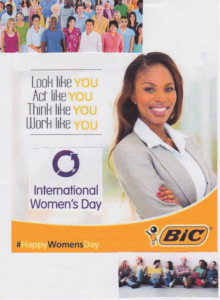My Chosen Advertisement:
Bic’s South Africa 2015 #HappyWomensDay advertisement

Critical Analysis of the Advertisement:
As a white woman who lives in North America, I have experienced my fair share of sexism. However, in my workplace this past March, on International Women’s Day, my boss — who is a white male — at work made a point of celebrating all of the women in our office. However, Bic, an international company decided that it was okay to utilize gender as a marketing tactic.
In this advertisement, it suggests four critical points:
- That you should look like a girl — assuming that all girls are innocent and vulnerable.
- Act like a lady — be polite, but don’t forget to be submissive to your male counterparts.
- Think like a man — because women can never have as meaningful thoughts as men (even on Women’s Day).
- Work like a boss — because in order to be a female leader in the workforce you must utilize your gender to your advantage?
In much smaller font at the very bottom of the page reads #HappyWomensDay — the entire point of this advertisement, to celebrate women, is undermined completely by the four points and the Bic logo.
The issue with this advertisement that I will be addressing is that Bic is utilizing gender and International Women’s Day to sell their products.
While Bic’s main product — pens — are not featured in this advertisement, it drips with subtext that Bic’s pens make you a boss and give you the ability to “think like a man” which is simply ridiculous.
To quote lecture 2.1, gender is “a multidimensional social construct that is culturally based and historically specific, and thus constantly changing [and] refers to the socially prescribed and experienced dimensions of ‘femaleness’ or ‘maleness’ in a society.”
Particularly what I am interested in zeroing in on in the fact that gender is a social construct and not something that defines “a boss.” Being male or female, if a person chooses to identify that way, does not make you any more or less capable to being a successful human being — being yourself does.
My Jammed Advertisement:

My Jammed Advertisement Analysis:
The point I am trying to make with my jammed advertisement is to keep the original goal of the ad intact while not utilizing gender as a tactic to sell pens.
I changed the words “girl”, “lady”, “man”, and “boss” to “you” because there is no reason not to celebrate “you” every day — especially on International Women’s Day, which is what the original advertisement was celebrating.
In addition to the changes I made, I added in a few photos because I felt singling out one person did not reflect what International Women’s Day stands for. I included two images of diverse groups and chose to not limit those photos to just women. One of my goals with my assignment is to deconstruct the social construct of gender.
I hope that my alteration invoked a feeling of inclusiveness. While I mentioned earlier in my assignment that my boss made a point of celebrating all the women in the office I work at on International Women’s Day, it would be great if the construct of this “day” didn’t exist.
Yes, it is wonderful to celebrate women. It is also wonderful to celebrate men. However, if these social constructs didn’t exist, wouldn’t we be able to celebrate every human every day?
While the original advertisement may on the ground level be to sell pens, it is full of layers that force the observer to question why women are not viewed as bosses in today’s society.
In my jammed advertisement, I highlighted the International Women’s Day symbol because we are living in a society where gender persists as a social construct and where people feel that they are a “feminist” because they celebrate International Women’s Day once a year — and that is just not legitimate. Women should be celebrated every day. Everyone should be celebrated every day.
I hope my jammed advertisement invokes these four feelings in every observer:
- To look like you
- To act like you
- To think like you
- And work like you
Regardless of “gender.”